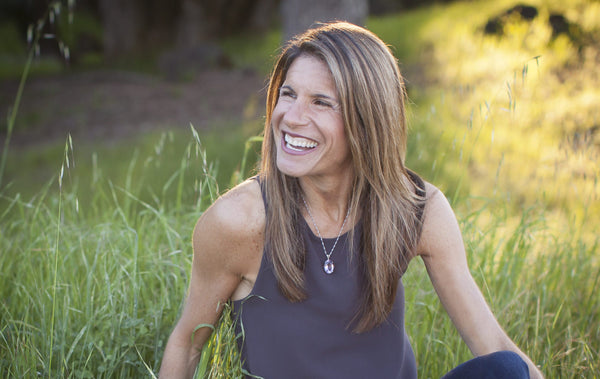How to Scale a Business with Heart

Sheryl O’Loughlin says there’s a dark side to entrepreneurship, but it’s possible to run a startup in a healthy, joyful way. In this conversation, we dive into Sheryl’s vast experience as a CEO, founder, mentor, and advisor to pull out key lessons she’s learned at critical moments in her career. Walk away with tips for launching and growing a successful business while maintaining a fulfilled life.
“It’s all gone.” When Sheryl O’Loughlin heard her husband utter those words, she was shocked. They had built what they were sure was going to be a successful business—Blue Sky, a restaurant and play space for families. But within months of launch, their finances were underwater, they were forced to close their doors, and they were on the verge of bankruptcy.
What she and her husband would learn from this failed business—and the concurrent massive success of Sheryl’s other startup, Plum Organics, which was acquired by Campbell Soup Company for $250M—helped shape her approach to entrepreneurship and leadership in the years to come. It gave her the perspective to see what mistakes to avoid and what risks to take. She went on to apply these learnings, and her previous experience as the CEO of Clif Bar, as the executive director at the Center for Entrepreneurial Studies at Stanford Graduate School of Business, where she mentored young entrepreneurs. And later as the CEO REBBL, an organic super herb and adaptogenic beverage company, where she led the business to impressive growth and increased social impact.
Now, while Sheryl claims to be retired, she’s diving into one of her biggest projects yet—focusing on justice, equity, diversity, and inclusion in the natural food products industry with an initiative she co-founded called the JEDI Collaborative.
Sheryl speaks frankly in her book Killing It about the enormous struggle she faced as an entrepreneur to balance her personal health and wellbeing and the growth of her companies. She joined us on the Creative Confidence Podcast to dive into what she’s learned over the years and share her advice for building and scaling a business with love, boldness, and humility. Here are some of the key points we took away.
“Nobody was talking about the most challenging parts of entrepreneurship.”
Design your venture from the start
At Stanford, Sheryl was worried. She saw young students with dollar signs in their eyes, motivated by the idea of finding instant success as an entrepreneur. And the same thought kept running through her head: “You have no idea how hard this is.”
Nobody was talking about the most challenging parts of entrepreneurship or the idea that to be successful, you can’t just hit on a great product idea. You have to design the entire venture from the start. So she worked with her colleagues Steve Blank and Charles Holloway to create a framework called Total Venture Design, a perspective that defined the approach of the Center for Entrepreneurial Studies at the Stanford Graduate School of Business.
The model shows the interconnectedness of three major elements of venture design—the venture ecosystem, the process and outside forces, and entrepreneurial leadership behaviors. A key takeaway is that all parts of a venture—from the product to culture and the business model—must be designed. And that this is an iterative, experimental process.
“The minute you start a company, yes the product idea is very important, but everything you put around that has an impact on where that company's going to go,” Sheryl says.
Openness to iteration is one lesson Sheryl took to heart when co-founding her business Plum Organics. Their product was originally for kids, but when the national buyer for Toys R Us babies approached them at a tradeshow and asked if they could do a huge order of baby food in their signature pouches, she and her co-founder Neil Grimmer knew it was worth it to try. It fit with their mission to help kids develop a lifetime love of healthy eating, and the demand was there. After many failed prototypes, they landed on a winning product that was carried in Toys ‘R Us stores nationally, and they shifted the whole business to focus on baby food.
She says it’s critical to have an entrepreneurial mindset when starting a new venture—something she calls bold humility. That means “being bold, but also having the humility to understand what is at stake.” When founding Blue Sky with her husband, she says their big mistake was being overly confident in their idea and not talking to enough people and experts to fully understand the market. If they had approached it with more humility, they may have discovered that their idea wasn’t meeting customer needs.
“We need to make sure that we are creating a truly regenerative business model.”
Sheryl O’Loughlin
Focus to scale revenue and impact
So you want your business to make money, but you also want to do good. Those two things don’t have to be at odds. Sheryl has found a way to marry the two at more than one company. And she’s encouraged by recent enthusiasm for this idea, like more companies becoming B Corporations and California Governor Gavin Newsom supporting the Fourth Sector Project, an initiative to accelerate “for-benefit entrepreneurship.”
At Clif Bar, the company started off focused on the product—an energy bar made with whole ingredients. When faced with the opportunity to sell the business, founder Gary Erickson decided to keep it private because he realized there was a huge opportunity to not only see more business growth, but to have a greater impact on the world. Sheryl took over as CEO soon after the decision to stay private and shepherded a new product, Luna Bar for women, onto the market, where it quickly grew to a $70M business. She also operationalized Gary’s vision for impact by helping to identify five bottom lines for the company—sustaining the business, brand, people, community, and planet—and creating a bonus structure that mapped directly to those pillars. For a company and its people to truly connect to the impact you want to make, Sheryl says “it has to be visible and people have to be accountable to it, even if it's hard.” By growing the business, Clif Bar was able to also broaden their impact. The two efforts worked hand in hand.
At REBBL, Sheryl’s challenge was the opposite. Born out of nonprofit Not For Sale, the company was founded with the intention of raising money to help stop human trafficking. When Sheryl joined as CEO, she saw that the tonic beverage, a heritage product the company had always offered, was doing well, but their new elixirs were growing like crazy. She went to the board and recommended temporarily killing off the tonic product to focus on elixirs—a strategic choice to use their limited resources more wisely and focus on growth instead of spreading the company too thin. The board was initially against the idea, but her argument won them over: “That's what got us here, but we need to make sure that we are creating a truly regenerative business model.” In order to meaningfully impact human trafficking, the business’s revenue had to grow. And thanks to Sheryl’s decision to focus resources, it did.
Starting a movement
Sheryl recently left REBBL as CEO to focus on new projects that tap into on her passion for diversity and inclusion. For those who eventually want to do the same, she says to think about how your career experience can set you up to have a greater impact later on.
“What you’ve developed over time is a platform based on your expertise, your talent, your experience, and your passion,” she says. When you’re ready to put it into action, you have the connections and tools to do it well.
With the JEDI Collaborative and Women on Boards Project, she’s aiming to make the natural products industry more representative of the communities it serves. We have a country that is over 50 percent women and, in the next 20 years or so, will be a majority people of color. For businesses to be successful, they must represent that.
Sheryl’s current focus is a project to measure the status of the natural products industry when it comes to diversity, equity, and inclusion in order to track change going forward. To do this, she’s aiming to get 500 companies to respond to an industry survey by the end of 2019. You can chip in by responding to the survey here.
“It's love that has more power than anything to drive us as a team.”
Sheryl O’Loughlin
It’s all about love
Whether you’re just getting ready to start your first business or thinking about what’s next after a long career, Sheryl says to remember that while entrepreneurship can be incredibly taxing, in the end, it’s all about love. Loving yourself enough to make room for your mental and emotional health, and running your business from a place of love. “It's love that has more power than anything to drive us as a team,” she says.
Compartmentalizing your life and your work can feel nearly impossible, but Sheryl thinks that’s the wrong approach anyway. Instead, make time to take a break from work, but let that happiness and love you find bleed over into your business.
“When I'm happy in my business, I come home and I bring joy to my family,” she says. “When I have joy with my family and I have a great weekend, I bring my creativity and my excitement back into the business.”
This kind of interconnectedness is what it takes to run a successful, impactful business without burning out. So think about the big picture when designing your business. And don’t forget that a big part of that picture is your own wellbeing.
Interested in learning a human-centered method for designing and prototyping a business? Check out our 5-week online course Designing a Business. And explore what it means to work and lead with purpose in our self-paced course Power of Purpose.
- choosing a selection results in a full page refresh
- press the space key then arrow keys to make a selection



